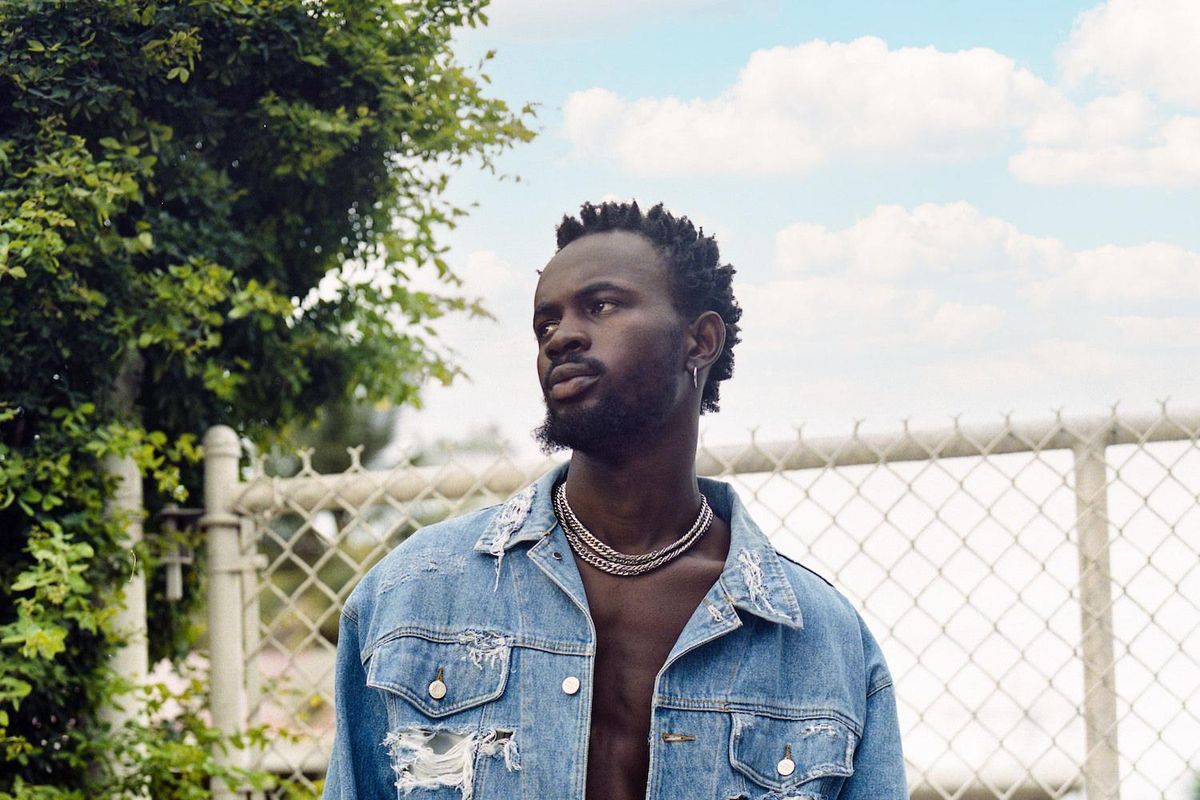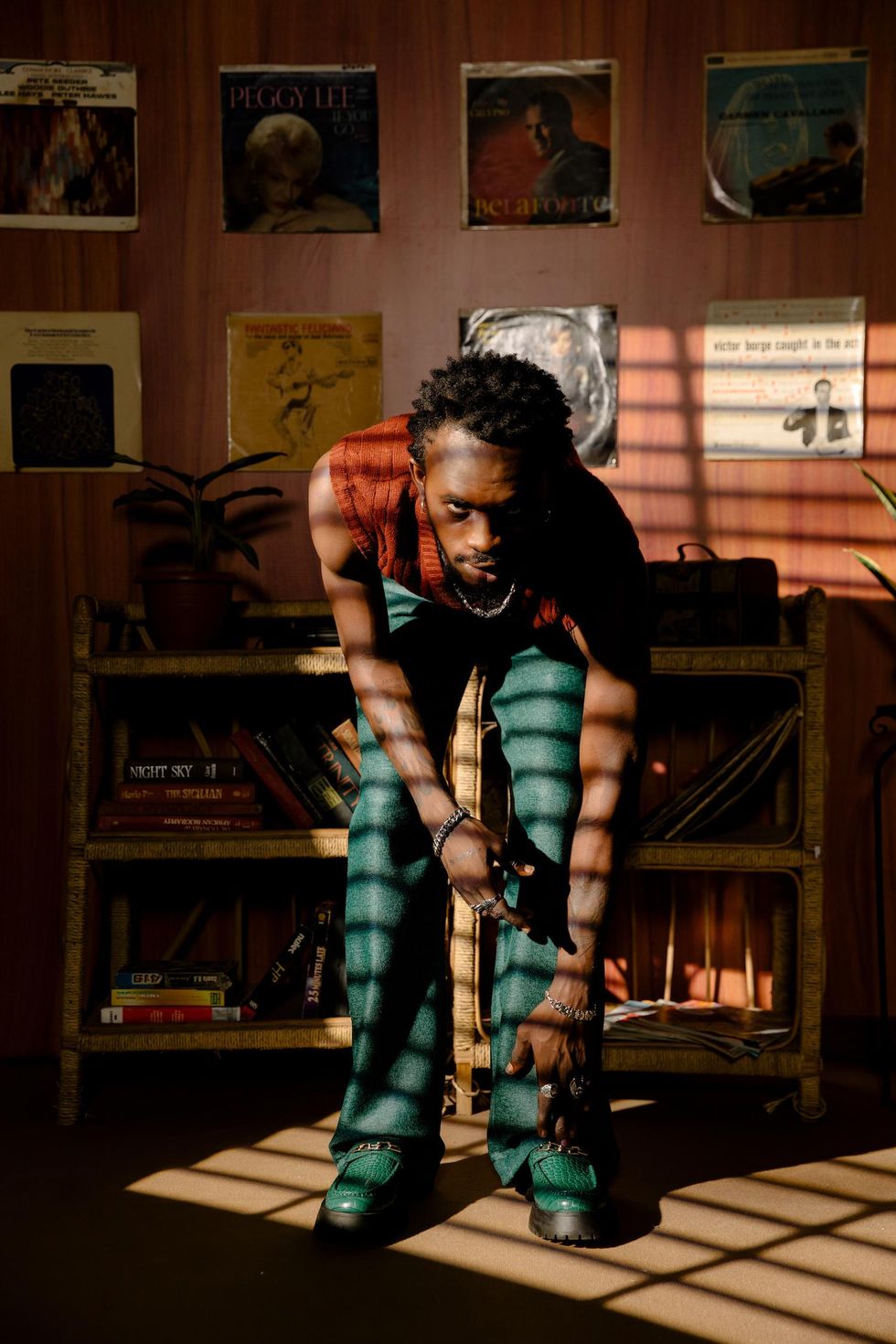For Black Sherif, This Is Just the Beginning
We talk to Ghana’s biggest breakout artist of 2022 about his come-up and the raw stories behind his debut album, The Villain I Never Was.

Black Sherif
Black Sherif is the biggest breakout star Ghana has seen in recent times.
Mohammed Ismail Sheriff, rapper, singer, and songwriter from Konongo, a town in Ashanti, Ghana made his official debut in 2020. He dropped a handful of singles, one of which was titled “Money,” a song in which Sherif narrates the difficulties and obstacles youth like him encounter on the path to success. “Money” was highly relatable for many, its blunt realism combined with his impassioned performance led to the song making the rounds on social media and local streaming services, and ushered the enigmatic artist into the public gaze.
In 2021, Black Sherif’s “First Sermon” arrived and became an instant game changer. Sherif’s brutally-honest content combined with his intense, animated performances became his distinct signature, and he became the up-and-coming artist on everyone’s lips. But what made him so different? What was the source of his widespread appeal? The answer is in his music. In it, you will feel his pain, introspection, frustration, self-blame, anxiety, loss, and doubt. All of these less-than-ideal situations and emotions we as human beings face but are not quick to speak on are all there, laid bare by Black Sherif for our collective consumption. His music is not an optimistic escape from reality. It's a candid chronicling of the bleak truths of existence—and that's what sets the young artist apart.

These underlying themes present in his his music resulted in Black Sherif being associated with the term “sad boy music.” However in Sherif’s case, it’s not just a cool catchphrase, it’s his life. Black Sherif has lived through a series of unfortunate events, and he’s not afraid to admit it. “[It’s] Real life, I’m sad and going through things,” he tells OkayAfrica. “I’ve been sad from time, it’s no fluke. I just happen to be real about it. I started this thing so early that people that knew me, even before I started making songs were like ‘yo this a sad boy ting.’ Songs I started making from school [have] been sad, because my life is just sad. Things that happen to me, sometimes I just think I’m overreacting or being dramatic but when I sit down and try to digest things, I just know that sad things have been happening to me from time [to time]. That’s why I say I’m a ‘sad boy.’ There’s so much pain.”
The anticipation and subsequent widespread reception of each new single prove that the stories Black Sherif is telling truly resonate with the public on a deeper level. “Second Sermon,” the follow-up to “First Sermon” was arguably the most anticipated Ghanaian single of 2021, earning the budding artist his first high profile feature, an official remix with Nigerian afrobeats superstar Burna Boy. “Kwaku The Traveler” came next. Dropped early in 2022, the song sparked a viral TikTok challenge, topped charts in Nigeria, and the official video currently sits at 13 million views on YouTube. The song also further cemented his newly minted superstar status, and nurtured demand for a full-length project from Blacko, the moniker he’s fondly referred to as by his core fans.
Fast forward to earlier this month, when Black Sherif released his debut album, The Villian I Never Was. The 14-song record is a raw and honest chronicling of his dreams, experiences, and the gloom-ridden occurrences of his life over atmospheric blends of trap and drill. “The whole idea behind the execution of the album was to create a safe space for me to vent,” he explains. “To be free, a place of freedom for me to talk about everything, to be real and roar, and my message is what runs through it.” On The Villian I Never Was, we’re blessed with an overdose of the same earnest ingenuity that made us fall in love with Blacko.

Black Sherif is an old soul in a young body. He’s only 20 years old, but his experiences, as well as his eloquence in communicating them, have the depth of someone twice his age. Among the stories he tells on the album is a somber one of love lost in “Oh Paradise.” It's one of the more melancholy songs on the album, in which he narrates the story of his high school lover, who he was robbed of by an untimely death. “Sleep well my lover / I will be fine my lover / And my love for you'll be forever,” are some of the fervent assurances Blacko utters. “Where I was in my head when I recorded that song was a very bad place. So dark. After I recorded the song, I didn’t like it for over two weeks. Just because of the space I was in at that time,” he mentions.
Explaining further, he tells me the idea behind the song “I was talking about my first girlfriend in high school, Tina. The reason why I talked about her is that I was real down that time. And for me, when I’m in that space I think about people that mean so much to me that I’ve lost, and I try to turn them into my angels. Because I believe in that, that everyone that used to be here with us is somewhere better and they know better and can help us be better. That’s what I was talking about. So the whole song is me turning her into an angel, telling her to speak for me because she’s close to the man looking after us.” He believes in the afterlife, and he believes that his lover is up there, advocating for him.
Black Sherif is an enigma to most, but this sincere conversation with him enabled me to explore his mind, and demystify exactly who he is and what he represents. Black Sherif and his music are the end result of a frustrated youth brimming with conflicting emotions, merged with a gift of uncommon creative ability and talent. A living bundle of contradictions that was able to find his expression in music, despite all odds. Despite his personal circumstances fortune has smiled on him, as Black Sherif has already attained heights in his career that most artists can only dream of. However, for the 20 year-old boy from Konongo, this is just the beginning.
Listen to The Villain I Never Was below.
- The Irrefutable Reign Of Black Sherif - OkayAfrica ›
- Listen to Black Sherif's Debut Album 'The Villain I Never Was' ›
- Black Sherif 'Second Sermon (Remix)' feat. Burna Boy - OkayAfrica ›
- 2023 Is the Year of Black Sherif - OkayAfrica ›
- Black Sherif, Africa’s Young Bright Black Star - OkayAfrica ›
- Black Sherif Unveils Heartrending Music Video For "Oh Paradise" - Okayplayer ›
- Black Sherif Releases 'Take Care of Yourself Blacko' Two Pack - Okayplayer ›
- Black Sherif Unleashes Genre-Defying Anthem "OH NO" - Okayplayer ›
- Listen to Black Sherif’s Highly-Anticipated New Album, ‘Iron Boy’ | OkayAfrica ›

